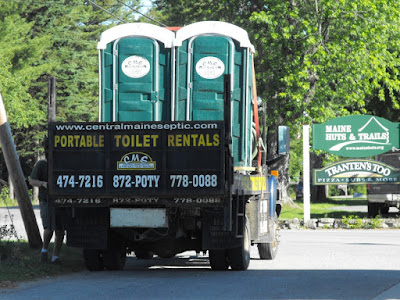My pal Jack used to be a police officer in Scotland. As a
beat cop, he was exposed to the seamy side of life…and that included becoming schooled
in the art of Foul Language. Years ago, Jack told me that a judge presiding over
the trial of one of his “collars” remarked that “foul” was the new “colloquial”
and that obscenities were so common, they’d lost their shock value.
Perhaps foul language HAS become the new norm…but does that mean
it is the best form of communication? Does something become acceptable simply
because it is common-place? And are we
expected to become inured to vulgarity because it is uttered in abundance?
I work at a high school. The students range in age from 13 to 18 years
old. Minute by minute, hour by hour, I
hear obscenities. Not occasionally, but
every single school day. During every
class period, at lunch, in the halls and in the gym.
I also have a Facebook page. Today’s so-called “social media”
seems to have become far less social than it once was. Vulgar language abounds; on FB memes, in “rants”
and in simple posts. A quick scroll can
harvest a handful of four-letter words.
Disclosure: I know how to cuss. Sometimes I drop a language bomb. I’ve been known to do it when I’m under
extreme stress, although (to the best of my knowledge) I’ve only done it in a “safe
space”, i.e. at home or in the presence of close family members. I’ve also uttered salty expressions with treasured,
trusted friends when we’ve been goofing off, venting or telling tales. I’ve
also co-written a novel that contains a liberal sprinkling of foul
language. (Caveat: I campaigned to
remove most of it…and lost the campaign.)
In truth, I respect – and will always defend – Freedom of Speech.
But here’s the thing: Just because a person CAN cuss, swear and be vulgar…does
that mean he/she always SHOULD?
No.
It has to do with respect; respect for others, as well as
respect for Self. It’s about the art of meaningful and productive communication. It relates to empathy. It pertains to
thinking about how your words affect others, as opposed to how those words make
YOU feel when you say or write them. It has to do with what you hope to
accomplish when you use vulgarity and then share it in a venue or a medium in
which it can be heard or read by – potentially -- thousands of people; people
who might be put off by your particular brand of vernacular.
Passion is great. Colorful,
expressive language is appreciated and can successfully make a point where
banal prose might be ignored. However, it’s important to consider the purpose
of our words. To know what our goal is when
we speak or write. Do we want to make a positive difference -- be it within our
own circle of friends, or even within the larger community? Are we encouraging people to learn, to hear
our point of view…and then, to perhaps come to share and support that view?
Or are we just looking for attention, and if so – what kind
of attention?
Years ago, I said the F-word during a conversation with my
father. It slipped out in a moment of
anger. Dad’s expression was almost…sorrowful.
I’ll never forget what he said to me.
“That diminishes you, daughter.”
Over the years, I’ve thought long and hard about that. While I don’t believe I regressed into a less
valuable human being because I used a vulgar word when I expressed myself, I HAVE
come to realize that my capacity for impacting others in a positive way is
influenced by the manner in which I speak.
Comparably, I, personally, am less inclined to take others seriously if
they can’t (or worse – WON’T) make a point without using foul or aggressive language.
“I am so fucking sick of that asshole and the shit he’s
doing! Someone needs to kick his ass to the curb!”
How do you feel when you read that? Do you feel good? Happy?
Energized in a positive, upbeat way?
And what do you think about the person who writes that? Do
you feel respect? Admiration? Is that person someone you’d be willing to listen
to at length? Someone you want speaking for you in a school, a courtroom or a municipal
or legislative committee room? Is that someone you’d want to wait on you in a
restaurant or a store? Would you choose that person to take care of your
children?
Or…
“I’ve researched that man’s actions and he’s lost my
respect. These are my reasons and here
is what I propose to do, in hopes of making a difference. Are you interested in getting involved?”
Show me your facts. Share your opinions. Offer a solution
instead of a diatribe. Speak with compassion rather than aggression. Give me action as an alternative to an
ineffectual rant…and I’ll listen. Heck,
I might even follow!
I don’t want to be “diminished”
and I certainly don’t want to diminish my capacity for communicating
effectively and productively. I want to
be inclusive instead of divisive. Yes, I’ll still have “real life” language in
some of my fiction. And yes, I’ll drop a
bomb once in a while. But this “vulgarity as the new norm” business isn’t for
me. If I wouldn’t say it to a grandmother, a minister, a judge or a school
principal, I’ll try not to say it on social (or in other) media.
After all…grandmothers sometimes read these things, too.










Well said and written Kaz. You are the best xx
ReplyDeleteI could not agree more. This kind of language says that the writer (or speaker) is incapable of assembling an argument or making a point, and can only make a display of offensiveness. Just as bad, from the viewpoint of someone who loves language, it’s simply . . . lame. It says “I can’t actually compose a sentence, so I’ll fill all the empty spaces with obscenities.”
ReplyDelete